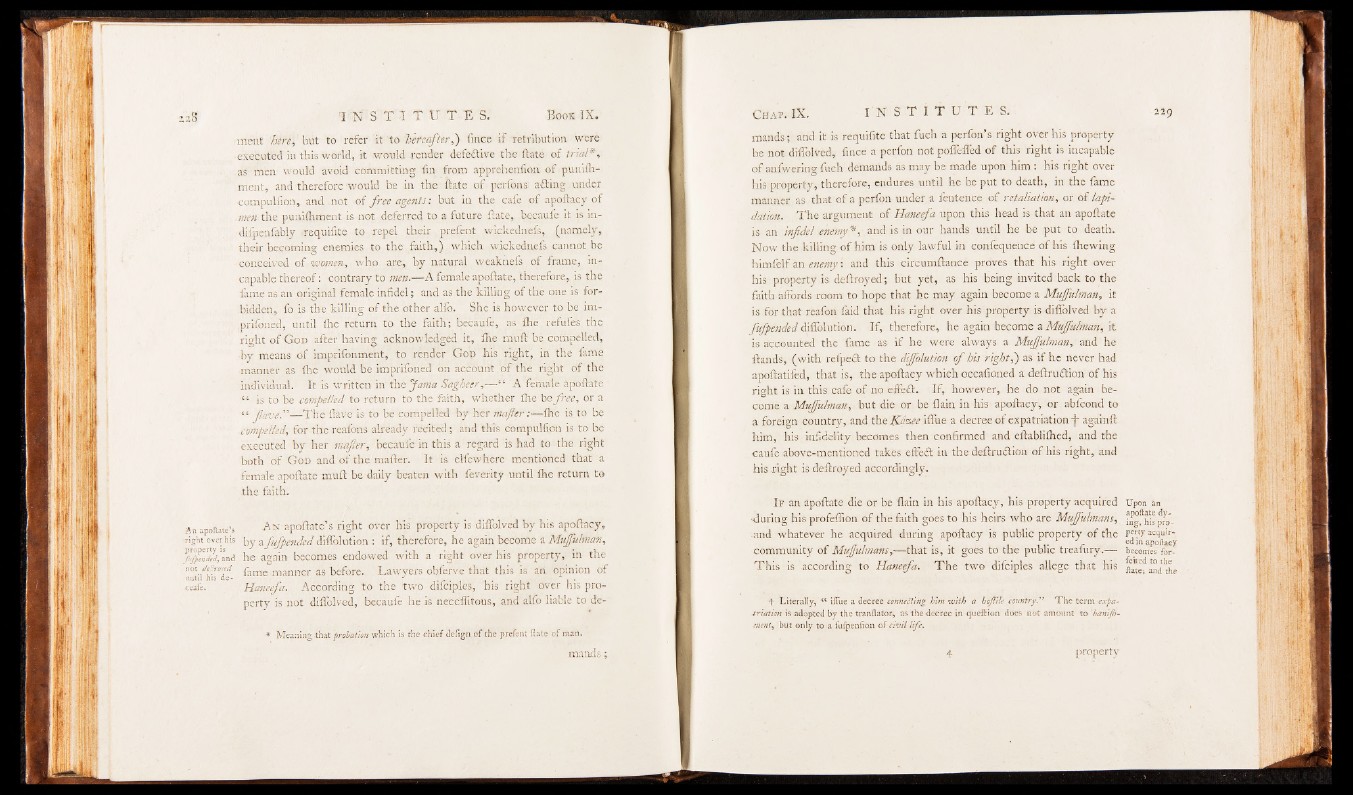
ment here, but to refer it to 'hereafter,) fince if retribution were
executed in this world, it would render defective the Bate of trial*,
as-men would avoid committing fin from apprehenfion of putiilh-
ment, and therefore would be in the Bate of perfons aCting under
■ compulfion, and .not of free agents-, but in the cafe of apoftacy of
.men the punifhment is not deferred to a future ftate, becaufe it is in-
difpenfably requifite to repel their prefent wickednefs, (namely,
their Becoming enemies to the faith,) which wickednefs cannot be
conceived of women, who are, by natural weaknefs of frame, incapable
thereof: contrary to men.— A female apoftate, therefore, is the
fame as an original female infidel; and as the killing of the one is forbidden,
fo is the killing of the other alfo. She is however to be im-
priioned, until the return to the faith; becaufe, as Ihe refufe's! th e .
right of G od after having acknowledged it, fhe mail be compelled,
by means -of imprifonment, to render God his right, in the fame
manner as fhe would be imprifoned on account of the right of the
individual. It is Written in' the Jama Sagheer,— “ A female apoftate ’
■ is to be impelled to return to the faith, whether fhe be free, or a
“ f iv e ."— The Have is to be compelled by her mafter:— fhe is to be
■ compelled, for the-reafons already recited; and this compulfion is to be
executed by her mafter, becaufe in this a regard is had to' the right
both of God and of the mafter. It is elfewhere mentioned that a
female apoftate mu ft be daily beaten with feverity until fhe return to
.the faith.
An apoftate’ s A n apoftate’ s right over his property is diffolved by his apoftacy,
■ right over his gy a f uJpencled diffolution : if, therefore, he again become a Mujfulman,
Vr l / f e f l d , and he again becomes endowed with a right over his property,- in the
fame manner as before. Lawyers obferve that this is an opinion of until his de- J . . . '■ A , .
ceafe. Kaneefa. According to the two dilciples, his right over his property
is not diffolved, becaufe he is neeeflitous, and alfo liable to de*
Meaning that p robation which is the chief defign o f the prefent (late o f man.
mands;.
mands; and it is requifite that fuch a perfon’ s right over his property
be not diffolved, fince a perfon not poffefled of this right is incapable
ofanfwering fuch demands as may be made upon him: his right over
his property, therefore, endures until he be put to death, in the fame
manner as that of a perfon under a fentence of retaliation, or of lapi-
dation. The argument of Haneefa upon this head is that an apoftate
is an infidel enemy*, and is in our hands until he be put to death.
Now the killing of him is only lawful in confequence of his fhewing
himfelf an enemy: and this circumftance proves that his right over
his property is deftroyed; but yet, as his being invited back to the
faith affords room to hope that he may again become a Mujfulman, it
is for that reafon faid that his right over his property is diflolved by a
fufpended diffolution. If, therefore, he again become a Mujfulman, it
is accounted the fame as if he were always: a Mujfulman, and he
ftands, (with refpeift to the diffolution o f his right f) as if he never had
apoftatifed, that is, the apoftacy which occafioned a deftrudtion of his
right is in this, cafe of no effeft. If, however, he do not again become
a Mujfulman, but die or be flain in his apoftacy, or abfeond to
a foreign country, and the Ka%ee iffue a decree of expatriation -j- againft
him, his infidelity becomes then confirmed and eftablifhed, and the
caufe above-mentioned takes effe£t in the deftrudtion of his right, and
his right is deftroyed accordingly.
I f an apoftate die or be flain in his apoftacy, his property acquired
‘during his profeflion of the faith goes to his heirs who are Mujfulmans,
and whatever he acquired during apoftacy is public property of the
community of Mujfulmans,— that is, it goes to the public treafury.—
This is according to Hanetfa. The two difciples allege that his
Upon an
apoftate dying,
his property
acquired
in apoftacy
becomes forfeited
to the
ftate; and the
+ Literally, “ iffue a decree conneâîing h im w i t h a h o jiile c o u n t r y T h e term ex p a t
r ia tio n is adopted by the tranflator, as the decree in queftion does not amount to 'bani/h-
m en t, but only to a fufpenfion o f c i v i l lif e .
property